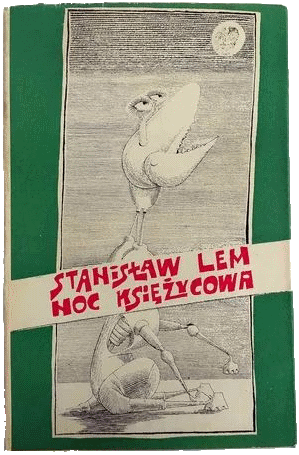Dziwny gość profesora Tarantogi
- by Stanisław Lem
- Feature Film
- Science Fiction, Comedy
- Adults
- Definite Time Travel
- Polish
- teleplay script.Dziwny gość profesora Tarantogi: Widowisko telewizyjne [Professor Tarantoga’s strange guest: Television show] by Stanisław Lem, in Noc księżycowa (Wydawnictwo Literackie, 1963) [Published as a TV script (“widowisko telewizyjne”) eight years before the 1971 Polish TV broadcast.].
I’d bet my last złotych that Lem is carefully satirizing the rule of the Polish United Workers’s Party in this story of a fourth-millennium man who hails from Mars and has room in his brain for two or three different personalities (Kazimierz Nowak, Hipperkorn, and possibly a dreaded Nanów), the first of which leapt from a touring chronobus in the 20th century where he hoped to find the inventor of time travel, Professor Tarantoga.
—Michael Main
W kilku słowach: w naszym społeczeñstwie decyduje o losie człowieka ranga intelektualna. Ludzie wartoœciowi, o zdolnoœciach wybitnych, mają prawo do całego, własnego ciała. Ja właœnie byłem takim, byłem samodzielnym, suwerennym meżczyznę!

translate
Briefly, in our society the fate of a person depends on his intellectual level. Valuable people with outstanding abilities have the right to their entire body. I was just that, I was an independent, sovereign man!
Tags
(8)
- Time Periods
- Circa AD 1960 to 1969: AD 1962
- Timeline Models
- Time Barrier: “Clearly not, because Archirix ordered a special barrier of time-absorbers to be built.
- Time Travel Methods
- Time Ships: “Have you seen a chronobus? But of course, you probably have other, older models. It looks like a flatbread, round, sort of like two plates folded together, only very large.”
- Themes
- Never Change the Past!: “But you can’t get out. You can’t even stick your leg out in cas you change something or whatever. I really don’t know. In any case, it’s prohibited.
- Nude Travel: “I wasn’t dressed at all. You can’t leave the chronobus wearing clothes. I had to take everything off. . . .”
- Time Travel Agencies, Safaris, and Tourists: “And on such chronobuses, you arrange excursions into the past?”
- Fictional Tags
- Groupings
Variants
(3)
- teleplay script.Dziwny gość profesora Tarantogi: Widowisko telewizyjne [Professor Tarantoga’s strange guest: Television show] by Stanisław Lem, in Noc księżycowa (Wydawnictwo Literackie, 1963) [Published as a TV script (“widowisko telewizyjne”) eight years before the 1971 Polish TV broadcast.].
- teleplay script.Странный гость профессора Тарантоги: Телевизионное зрелище [Professor Tarantoga’s strange guest: Television show] by Stanisław Lem, in НФ: Альманах научной фантастики 2 :: NF: Al'manakh nauchnoy fantastiki 2, unknown editors (Знание :: Znanie, 1965).. . . . . . . . . . . . . . . . . . . . . . . . . . . . . . . written by Stanisław Lem as by Станислав Лем
- possibly expanded or revised from Lem’s original script.Dziwny gość profesora Tarantogi [Professor Tarantoga’s strange guest] by Stanisław Lem [?], directed by Tadeusz Wronkiewicz (unknown TV venue, Poland, 1971).Stanisław Lem (story)
Derived Works
(1)
- Professor Tarantoga und sein seltsamer Gast by Dr. Albrecht Börner, directed by Jens-Peter Proll (21 April 1979).
Indexer Notes
(3)
- 1963 Published Script—For us, the 1963 script and the Polish 1971 made-for-TV movie are variants of the same work rather than separate works because the 1963 publication was an actual TV script (“widowisko telewizyjne”) rather than a story, and we believe that the TV film was adapted from the script more or less directly, although it could have been expanded or otherwise revised.
- 1971 Polish TV Film—The director was Tadeusz Worontkiewicz as per a filmography of his work, which also lists the year as 1971. We have no other details of its broadcast, although it probably appeared on TVP1 or TVP2, since those were the only two TV stations in Poland in 1971.
- 1965 Russian Translation—The translator was А. Громова :: A. Gromova as per Fantlab, which also lists the year as 1965. Additional details are from Goodreads.
